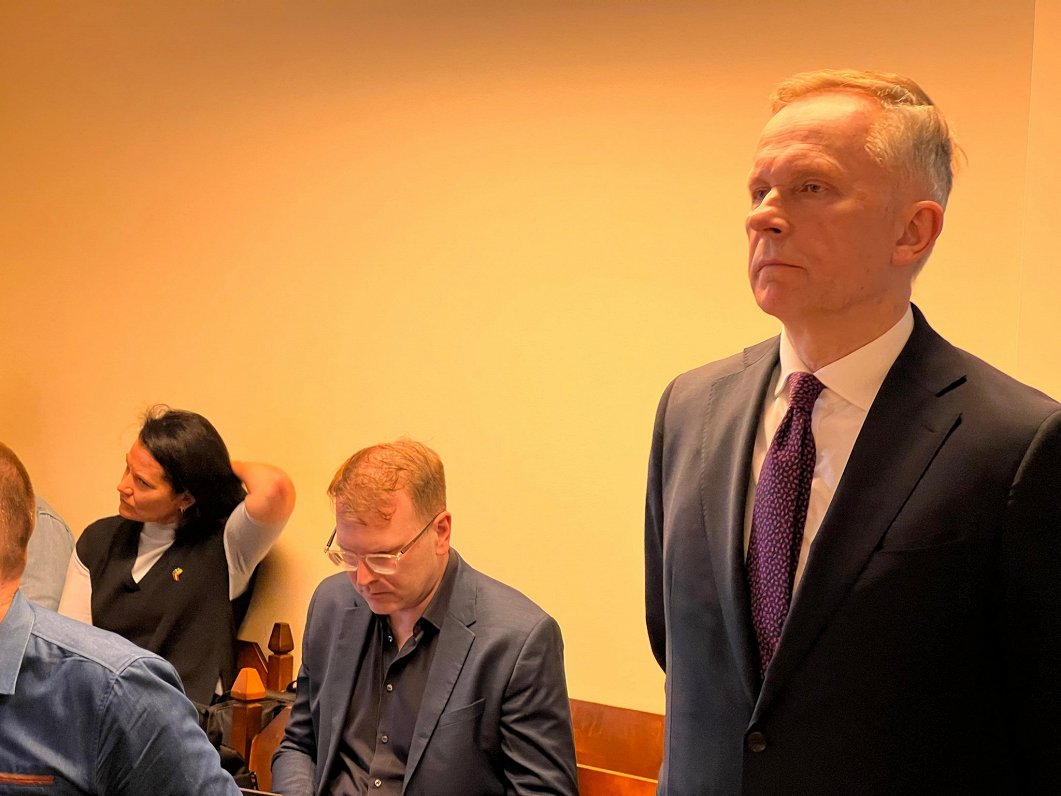The Riga District Court in Jūrmala sentenced the former president of the Bank of Latvia and European Central Bank governing council member Rimšēvičs, to six years of imprisonment, with a ban on holding state and local government positions for 5 years and a probationary period of one year and one month, as well as confiscation of property.
The court sentenced his fellow defendant, businessman Māris Martinsons, to five years of imprisonment plus confiscation of property.
The court found Rimšēvičs guilty of accepting a bribe and material inducements. The court also decided to confiscate his property – approximately EUR 25,000 held in several accounts, a residential building in Langstini near Rīga, an apartment in Jūrmala, and real estate in Jūrkalne parish.
For Martinsons, the court ordered the confiscation of property worth approximately 175,000 euros.
For both defendants, the court decided to count the time they spent in detention following their arrest in 2018 – amounting to just two days – as serving part of their sentences.
The ban imposed on both defendants from leaving the country was left in effect by the court until the date of entry into force of the verdict.
The court also ordered the collection of EUR 3.1 million and the confiscation of property for the company involved in the case, SIA MM investīcijas, which is accused of processing bribes.
The court also made a side decision to initiate separate criminal proceedings against the former minority shareholder and board member of "Trasta komercbanka" Viktors Ziemelis in connection with knowingly providing false information to the court.
Right after the verdict was announced, before leaving the courtroom, Rimšēvičs told journalists he would appeal the verdict. He has maintained his innocence ever since his arrrest more than five years ago.
As reported by LSM at the time, Rimšēvics' arrest by the anti-graft Corruption Prevention and Combatting Bureau (KNAB) in February 2018 caused major international headlines and added to Latvia's unwanted reputation for nefarious dealings in its banking sector. Since then a major clean-up of the sector has taken place, but the verdict in the Rimšēvičs trial has been keenly awaited.
The actual trial began four years ago and has seen numerous twists. The first judge appointed to the case announced that she was quitting the legal profession entirely shortly after being handed the high-profile case, despite being a young judge seemingly still in the early stages of her career.
The case was initially referred to the Riga City Vidzeme Suburb Court because, according to the prosecutor's office, the alleged crimes were committed in Riga. However, the Riga City Vidzeme Suburb Court then sent the case to be tried in Jūrmala, because the last offense mentioned in the case was allegedly committed in the seaside resort.
The case has also seen input from the European Court of Human Rights (ECHR), which ruled that Rimšēvičs was lawfully arested, and at one point the European Central Bank got involved over whether Rimšēvičs – who stubbornly refused to step down from his position until his third term of office was up – was able to attend ECB meetings.
Rimšēvičs also lodged a complaint with the Court of Justice of the European Union (CJEU) about restrictions on his movements as an ECB governing council member. He gained some encouragement from an initial ruling in 2019, but a later judgment from the CJEU in 2021 said: "where a criminal authority finds that the conduct investigated by it of a governor of a central bank of a Member State was manifestly not committed by that governor in his or her official capacity, proceedings against him or her may be continued since immunity from legal proceedings does not apply... Acts of fraud, corruption or money laundering are thus not carried out by such a governor in his or her official capacity."
Rimšēvičs remains the longest-serving governor in the history of the Latvian central bank, having held the post from 2001 to 2019. During that time he collected awards including the famous French Légion d’Honneur in 2015.
In 2014 he was awarded the high state decoration the Order of the Three Stars (third class) by Latvia "for merit in public work, significant contribution to the stable and sustainable development of Latvia's national economy and ensuring the successful accession of Latvia to the Eurozone."
He is also notable for being the first student to go to the U.S. as an exchange student in the lead up to the regaining of Latvia's independence, and his biography even partially inspired a controversial play 'Success Story' at the Latvian National Theater.




























